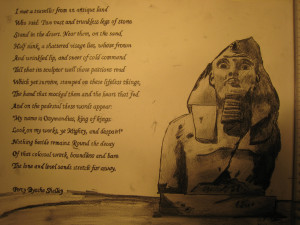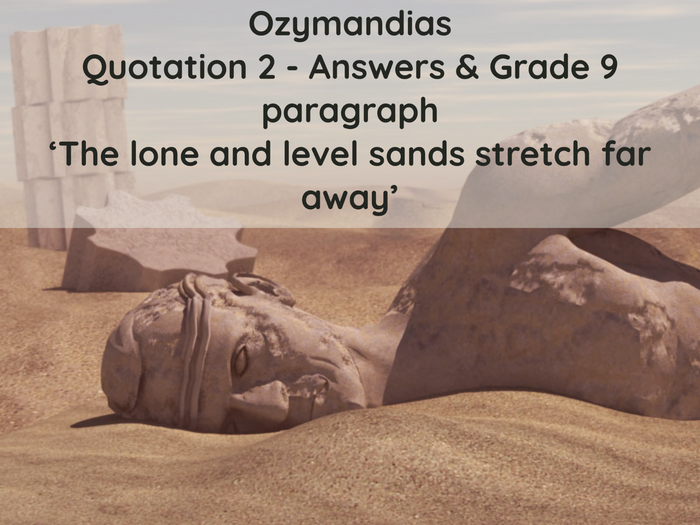
This is a second-person plural pronoun, already obsolete by Shelley’s time.

Or "Ye who are mighty look upon my works and despair!" Read it as "Look upon my works, ye who are mighty, and despair!" "Look upon my works, you mighty, and despair!" seems a bit confusing
#Ozymandias quote full#
One does not correct great poets and writers, particularly when they have used the full resources of the language to great and brilliant effect. Thus I'm lead to believe that Shelley really meant to have "ye mighty" be read as "you mighty", This, of course, contrasts starkly with what is, in fact, currently around him, and reminds the reader that all wealth and power are transient. Ozymandias’ words are bursting with hubris: He is sneering in contempt at other, contemporary, kings and rulers (or anyone else who might read the words written in stone so as to last an eternity) who might try to claim that they are “mighty” when all they need do (according to him) is look around to see his power and wealth and all that he has done, which (according to him) renders their efforts and success as nothing. Kings and gods speak like that - we only have to consider religious language today that often seems to think that God speaks some form of 17th century English :) Gods and kings declaim things - the use of "ye" give an air of great confidence, power, and authority. The religious and historical aspect are at play here as a literary device: Ramses II was a king and god. Its current use is chiefly dialect, ceremonial, historical and religious. Ye is/was the nominative second person plural pronoun. If any want to know how great I am and where I lie, let him outdo me in my work." The original inscription, in translation, was: "King of Kings Ozymandias am I. Despair, because you, too, shall be forgotten."īy the way, the poem was inspired by two actual statues, one of them a broken head and torso in Egypt, and an inscription on a different statue. To modern people the inscription means, "If you think you are mighty, look at me, I vanished from history, and so will you. Despair, because you will never be as great as me."īut his empire collapsed and left nothing but a broken statue. When the king was alive, he thought the words meant "If you think you are mighty, just look at me, I am greater than you are.

Third point: the inscription has an ironic double meaning. Second point: the reason he uses ye instead of you is because it is supposedly an ancient inscription, and ye sounds like old-time language, rather than coming from Shelley's own time. "Look on my works ye mighty and despair."įirst point: you are correct, the ye is equivalent to you.

In Shelley's poem this is "ye Mighty" line is chilling and continues the tension created a couple of lines earlier this tension is only released by the ending of the poem.īut reading this line as "Look on my works, you Mighty, and despair!" seems a bit confusing - who would Ozymandias/Ramesses be addressing? Kings of other lands? His minions or other supplicants? Why does Shelley have Ozymandias promote those who in his eyes were subject to his own dominion by calling them "Mighty", only to instruct them otherwise to fear and despair his lordship? Thus I'm lead to believe that Shelley really intended to have the "ye" in "ye Mighty" correspond to the second-person pronoun as in "you Mighty", much as Herrick had earlier charged the virgins to "Gather you rosebuds while you may". Further I suspect "y" as "th" was limited to typeset print, while a fair copy of Shelley's own (handwritten) manuscript attests to his use of "ye": I don't believe that the "y" in ye is the digraph thorn as in "Ye Old Curiosity Shop", because I think such practice was not common by the beginning of the 19th century. Look on my works, ye Mighty, and despair!

Percy Bysshe Shelley's Ozymandias is a well-known and oft-referenced English-language poem from the early 19th century, and purports to quote - presumably in translation from Egyptian hieroglyphs - a line from the pedestal of a statue of Ramesses II (c.


 0 kommentar(er)
0 kommentar(er)
